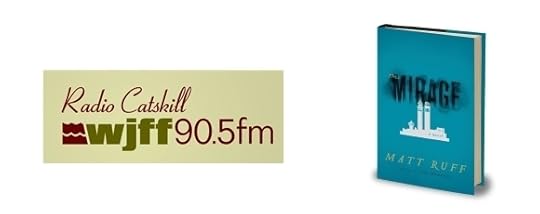Matt Ruff's Blog, page 34
February 2, 2013
Talking about The Mirage tonight on The Catskill Review of Books (WJFF 90.5 FM)
Earlier this week I taped an interview with Ian Williams for his radio program The Catskill Review of Books. The interview will be broadcast tonight at 7 PM Eastern Standard Time on WJFF Radio Catskill 90.5 FM. (You can listen to a live webstream here.)
February 1, 2013
Attention fellow authors: The NEA is taking applications for its 2014 Prose Literature Fellowships
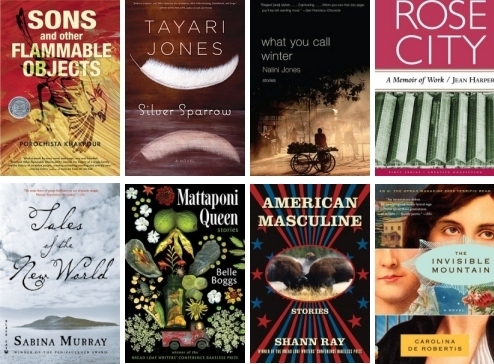
Some of my personal favorites from the class of 2012
The National Endowment for the Arts is currently accepting applications for its 2014 Prose Literature Fellowships. I won one of these in 2006, and in 2011 I served on the selection panel for the 2012 Prose Fellowships. If you are an American citizen or permanent resident and a published author of fiction or creative nonfiction, you should at least think about applying. The deadline for applications is February 28.
What this is: The NEA Literature Fellowships are $25,000 grants meant to support the recipients’ creative work. Fellowships are awarded annually, alternating between creative prose and poetry in successive years.
Who is eligible to apply: The full eligibility requirements are here, but the main points are that you must be (1) a citizen or permanent resident of the U.S. and (2) a published author of fiction or creative nonfiction.
How the Fellowships are awarded: All applicants are required to submit a manuscript sample of their writing (20 to 25 pages in length, double-spaced). These manuscripts are reviewed by a selection panel, which discusses and ranks their favorites. The highest-ranked manuscripts are recommended to the NEA’s chairman, who makes the final decision.
Links:
NEA home page
Literature Fellowship index page
Official grant program description
How to prepare and submit an application
NEA Writer’s Corner: sample work by previous recipients
Frequently asked questions:
How many Fellowships are given out?
The exact number varies depending on the NEA’s current budget, but the average is around 40.
How many applicants are there?
This also varies, but there’ll be more than 1,000.
What are the judging criteria?
The quality of the writing, period. It’s a blind judging process: The manuscripts don’t have the authors’ names on them, so the writing is all the panelists have to go on. (In the event that a panelist recognizes or guesses the author of a piece, they have to report it, and if there’s even a chance of a conflict of interest, they don’t get to vote on that manuscript.)
Who is on the selection panel?
A mix of “experts” and “laypeople”: Writers (including former Fellowship recipients), book critics, librarians, and bookstore owners. The panel will be roughly equal numbers of men and women, ethnically diverse, and from all regions of the country.
Can you be a little more specific about how the judging process works?
There’s a full description of the process here. (N.B., the exact details may have changed since that pamphlet was written, but it’s a good general overview of how it works.)
Do genre fiction writers have a shot at this, or is it only for literary types?
The Fellowships are open to anyone with talent. You’ll be up against some stiff competition, but you shouldn’t think that writing in genre is itself a handicap. I got my Fellowship on the basis of an excerpt from Set This House in Order, a novel that also won a James Tiptree, Jr. Award. And Kelly Link got her Fellowship on the basis of a short story that had zombies in it. Don’t worry about labels; worry about being good.
Do you have any specific advice for applicants?
I’d offer these suggestions:
Follow the rules carefully and to the letter. Don’t put your name on the manuscript. Don’t exceed the maximum page length.
Don’t waste time getting to the good stuff. Your manuscript will be in a pile with over a thousand others, so you want it to stand out from the very first page.
If you are excerpting from a longer work, the excerpt needs to be able to stand and be judged on its own. It’s great to leave the panelists wanting more. What you want to avoid is a situation where they’re saying, “This intrigues me, but without knowing where it’s going I’m not sure what I really think of it.”
If you are submitting two or more short pieces, the most important thing is that they all be good, but if you write (well) in multiple genres, you should also think about demonstrating your range.
Good luck!
January 28, 2013
Coming up for air
I’ve been making good progress on the new novel, hence the lack of recent posts, but with The Mirage paperback publication coming up in two weeks, it’s time for me to come out of my little room and practice talking to people again. (I also need to shift gears mentally from 1950s Chicago and New England, where I’ve been for the last six months, to alt-universe Baghdad; I expect some culture shock).
I’ll be doing readings in Seattle and Portland in conjunction with the publication; my current schedule is here.
In other news:
* The late, lamented Seattle indie bookstore Queen Anne Books is being reincarnated as the Queen Anne Book Company! It’ll have a new owner and new management (and is, technically, an entirely new bookstore), but it’ll be in the same location and at least some of the old Queen Anne Books staff will be returning. The grand opening is March 1. You can follow the new store on Facebook and Twitter.
* I’ll have a separate, longer post about this soon, but the National Endowment for the Arts is currently accepting applications for their 2014 Literature Fellowships in Prose. These are grants of $25,000 for fiction and creative nonfiction writers who are either citizens or permanent residents of the United States. The deadline for applying is February 28. More details here.
 * Iran is claiming it launched a monkey into space. No word on which monkey, but I have my suspicions. In semi-related news, Bigelow Aerospace is partnering with NASA to test an inflatable space module. The prototype will be attached to the International Space Station, but the long-term goal is to develop a line of standalone orbital bouncy castles for rich people. Warren Ellis is skeptical.
* Iran is claiming it launched a monkey into space. No word on which monkey, but I have my suspicions. In semi-related news, Bigelow Aerospace is partnering with NASA to test an inflatable space module. The prototype will be attached to the International Space Station, but the long-term goal is to develop a line of standalone orbital bouncy castles for rich people. Warren Ellis is skeptical.
* Rat City Rollergirls season 9 has started. The next bout is February 9 at Key Arena. Grave Danger will be going up against the Throttle Rockets, and the Sockit Wenches face visiting Terminal City Rollergirls team the Bad Reputations.
January 11, 2013
The Mirage P.S. edition on sale February 12
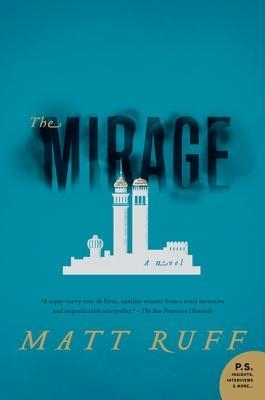 The trade paperback edition of The Mirage will be published next month. I just got my author’s copy in the mail, and it looks great.
The trade paperback edition of The Mirage will be published next month. I just got my author’s copy in the mail, and it looks great.
I’m currently scheduled to make appearances in Seattle and Portland, OR on the following dates:
February 20, 7 PM — Reading and signing at U.W. University Book Store in Seattle.
February 28, 7 PM — Reading and signing at Elliott Bay Book Company in Seattle.
March 7, 7:30 PM — Reading and signing at Powell’s Books on Hawthorne in Portland, OR.
I’ll post about additional dates when and if they are scheduled, and you can always find the most up-to-date schedule by clicking on the Appearances tab.
January 1, 2013
December 31, 2012
Goodbye 2012
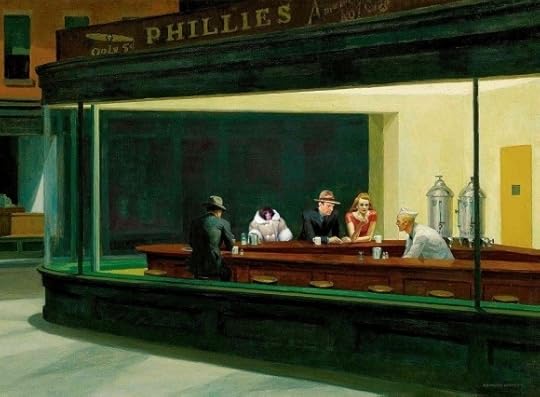
Edward Hopper’s IKEA Monkey (via @SamSykesSwears)
Paul Constant, who is nominally the Books Editor for the Seattle Stranger — though lately his duties seem to have expanded to writing half the content of the paper — invited me to contribute to the annual Regrets Issue, in which staff and local celebrities confess their professional and personal regrets about the year just ended. Naturally, I missed the deadline. So, yeah, sorry about that, Paul, but the truth is this has been a good year for me, and the few disappointments were things beyond my control.
The big news, of course, was the publication of The Mirage. My book tour recap post is here, and the full list of Mirage-tagged posts is here. My Big Idea essay for John Scalzi’s Whatever blog and my interview with Nancy Pearl are both worth a look. And if you’re at all curious about book design, check out the Huffington Post interview with artist Oliver Munday, in which he discusses the evolution of The Mirage‘s cover art.
The Mirage made the San Francisco Chronicle‘s “Best science fiction and fantasy books of 2012″ list and Alyssa Rosenberg’s list of “65 Favorite Things From the Year in Popular Culture.”
The American trade paperback edition of The Mirage will be published in February 2013. I will be appearing at the U.W. University Book Store at on February 20 at 7 PM and at Elliott Bay Book Company on February 28 at 7 PM. A German translation of The Mirage is scheduled for publication in Winter 2013. No word yet on whether there’ll be a German book tour to accompany publication, but just to put it out there, I’d be happy to come if my publisher invites me.
I remain hard at work on what I hope will be my next novel. If it were a Bad Monkeys-sized book, it’d be almost half done now, but it looks like it’s going to be a lot longer, so I’m just getting started. Stay tuned.

The one truly sad note of 2012 was the passing of Queen Anne Books, my favorite Seattle independent bookstore. Since QAB shut down at the end of October I’d been hoping a new owner might swoop in to resurrect it, but it wasn’t to be, and by now the staff, the real heart of the store, have moved on to other things. I wish them all the best, and will always be grateful for the decade of support they gave me and my novels.
So, on to 2013! And just to start things off right, have another monkey, courtesy of ZooBorns’ “Top 25 of All Time” list:
December 27, 2012
Christmas visitors
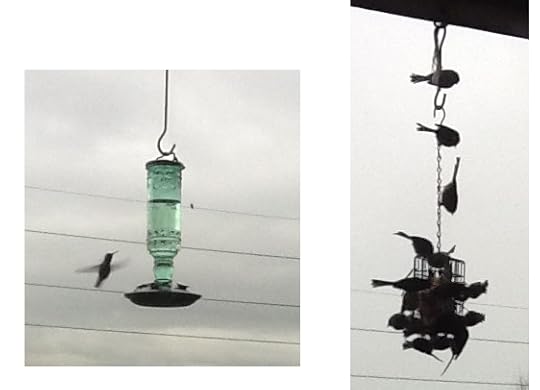
On the left: The fully winterized Anna’s hummingbird, one of our consolations for living in a gray, damp city that’s just a little too warm for holiday snow.
On the right: Psaltriparus minimus, aka the American bushtit. These guys are smaller than chickadees and have a tendency to swarm the suet basket like really cute houseflies.
December 17, 2012
Happy Mayan Apocalypse Week
December 7, 2012
Photo of the Week
After 35 years together, Jane Lighty and Pete-e Petersen become the first gay couple to receive a marriage license in Washington state:

photo © David Ryder/Getty images
December 3, 2012
Skyfall
 Lisa and I saw Skyfall on Thanksgiving. I found it a mixed bag, though entertaining enough: Great character work (for the most part), good action sequences, occasionally muddy plotting, and a number of storytelling choices I just didn’t agree with. Lisa says it felt more like a Bourne movie than a Bond movie, which is fine if you make it work, but they didn’t, quite. Part of the problem, she thought, is that the filmmakers insist on keeping certain Bond tropes—notably, the womanizing—even when they don’t really fit.
Lisa and I saw Skyfall on Thanksgiving. I found it a mixed bag, though entertaining enough: Great character work (for the most part), good action sequences, occasionally muddy plotting, and a number of storytelling choices I just didn’t agree with. Lisa says it felt more like a Bourne movie than a Bond movie, which is fine if you make it work, but they didn’t, quite. Part of the problem, she thought, is that the filmmakers insist on keeping certain Bond tropes—notably, the womanizing—even when they don’t really fit.
Thoughts:
* Great opening. Bond crawling off to mope because he’s miffed at M is classic.
* The Bond/M relationship is one of the best things about the Craig Bond films so far, so I was sorry to see her go. Lisa suggests, and I agree, that the ending would have been stronger if they’d let M kill Silva. Even better if they’d figured out a way to reprise the opening and have M risk killing Bond in order to get the bad guy.
* I’m apparently in the minority in having really liked Quantum of Solace. One of the things I was looking forward to in Skyfall was seeing where they’d go next with the Quantum organization, so I was disappointed when they decided to just drop it. Hopefully that’s temporary, and we’ll get a chance to see an updated take on Ernst Stavro Blofeld in the next movie.
* Ben Whishaw’s Q is awesome. No surprise there.
* I liked Javier Bardem’s Flaming Big Bad, although part of that is just me being impressed by a great actor taking a role that could have been a horribly offensive stereotype and somehow making it work. And though the character was fine, the Rube Goldberg plotting got a little strained. I’m cool with villainous schemes that don’t make sense, but the trick is keeping things moving so that the audience doesn’t have time to care about the plot holes. There was a point when Bond and Silva were running around the subway tunnels when my disbelief de-suspended and I found myself asking, “If he wanted to come to London and mess with M, why didn’t he just buy a plane ticket? Why all this needless complication with getting himself captured? And how the hell could he know that train would be coming right when he needed to drop something on Bond’s head?”
* Related to the above, the whole public inquiry scene fell flat for me. The problem is that Judy Dench is defending an absurdity: the idea that James Bond-style spy antics represent a rational national intelligence strategy. They don’t, of course, any more than Silva’s schemes make sense. Having Dench argue that they do is like bringing on a doctor to explain how you really can survive falling hundreds of feet from a train trestle after being shot with a sniper rifle. If you feel you have to make that case, you’re in the wrong movie.
* I’m torn on the character of Moneypenny. If I think of her as a kick-ass field agent who decided to become a secretary because she made one little mistake, she’s a disappointment. But if I think of her as Moneypenny—a woman who in previous incarnations was never anything but a secretary—with a surprising new backstory as a kick-ass field agent, that actually becomes kind of cool, especially if her field agent days aren’t over. I think the way I would have gone with this would be to find some way of combining the secretary and field agent roles from the start, rather than suggesting she’d gone behind a desk because she couldn’t cut it in the field. As it is, the revelation that she’s more rather than less than we’d expected comes too late in the film.
* With the exception of the nameless Turkish gal he hooks up with early in Skyfall, every woman Craig’s Bond sleeps with ends up dying in a particularly gruesome fashion. There are valid storytelling reasons for doing this. In a “gritty” action film, supporting characters are going to die in horrible ways, and it makes sense to pick on people the hero cares about. And nothing demonstrates how evil the bad guy really is than having him sadistically murder the good guy’s family/lover/best friend/dog. And yes, these are cliches, but if you don’t like those, what are you doing buying tickets to the 23rd film in a franchise?
That being said, I like stories that have the guts to do things differently. My favorite part of Quantum of Solace was Bond’s relationship with Camille. A more typical Bond film would have had the two of them fall into bed together as a matter of course (and would probably have had Bond kill the general for her, rather than letting her take her own revenge); instead, Quantum keeps their relationship professional, except for that wonderfully awkward goodbye kiss.
Skyfall goes the other way, giving us Sévérine, a former child sex slave now in thrall to Silva. Bond offers to free her from bondage if she’ll tell him where her boss is hiding, and she accepts. A little while later, Bond shows up on her boat, catches her in the shower, and without so much as a hello strips off his clothes and joins her. Whereupon Lisa and I looked at each other in the theater and said, “Really?” Because walking in naked on a woman you’ve just met is a risky move under the best of circumstances, but when the woman in question is a sex slave, it’s just twelve kinds of wrong. More to the point, it’s twelve kinds of wrong that aren’t consistent with the character Craig is playing. The Connery Bond, sure, but Craig’s Bond, despite fronting misogyny when he’s feeling wounded, isn’t a rapist. The only way that shower scene makes sense is if you’re following a studio mandate that says he’s got to have sex with at least one named Bond girl per film, and Moneypenny’s off the table because she’s a special case.
* …and then, Silva shoots her in the head. I get it; he’s evil. Also, Bond is off his game, can’t shoot straight, and so can’t save her by winning the William Tell game. Oh, the humanity! Except it’s not true: Right after Silva kills her, Bond reverts to form and wipes out Silva’s henchmen. I imagine the filmmakers would argue that it was the shock of Sévérine’s death that allowed Bond to do what he did, but I just felt like I was being messed with.
* So Bond had a Batman childhood. In Scotland. Interesting, and it kind of works. I did like the showdown at the old country estate. And I liked Albert Finney’s loyal old butler gamekeeper, although Lisa makes another good point: Silva should have killed him at the chapel. Silva’s evil, remember, so why would he spare the life of an old man who was impinging on his alone time with Mom? The answer, probably, is that the filmmakers didn’t think the audience would like seeing the nice old man get shot. Which is fine, but then how about applying some of that sentimentality to Sévérine?
* I am curious to see where they go from here. Craig’s Bond is still my favorite so I hope he sticks around for at least one more film. (Though the rumors that Idris Elba may be next in line are intriguing.)

